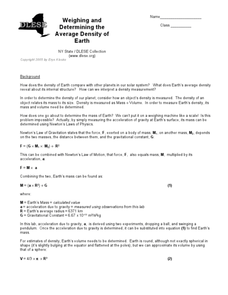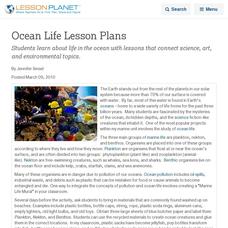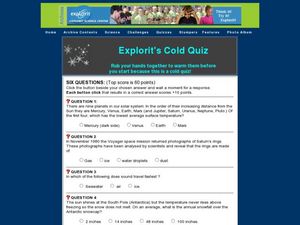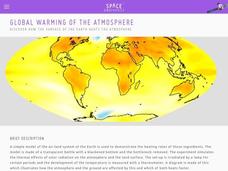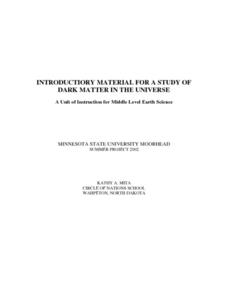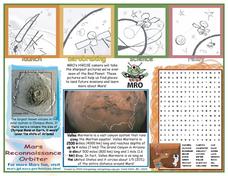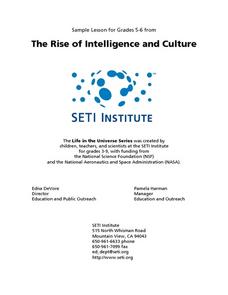International Technology Education Association
Pixel This!
Did the image I drew match the image you saw? By simulating a satellite and a ground station, teams of two transmit data in the form of pixels in order to recreate an image. They use four different levels of brightness, creating slightly...
Curated OER
Weighing and Determining the Average Density of the Earth
Some background information about density and Newton's Laws of gravitation and motion assist pupils in the following experiment. The procedure will help them further their understanding of gravity, pendulums, and a drop-ball experiment....
NASA
Taking Apart the Light
Break down light into spectra. Scholars learn how atoms emit and absorb photons and come to understand how this process allows scientists to identify different atoms based on either absorption lines or emission lines. Learners then...
Curated OER
Fact or Fantasy?
Are we alone in the universe? This brief informational text on extraterrestrial theory has been split into seven sections to help scholars practice note taking. They read the statements, underlining key words. Then, using the graphic...
Chapman University
The Standard Model Poster
Chemistry classes will appreciate this color-coded, single-page reference sheet for The Standard Model of particle physics. It is divided into two main sections: elementary particles and compound particles, both with their antiparticles....
Curated OER
Ocean Life Lesson Plans
Students learn about life in the ocean with lessons that connect science, art, and environmental topics.
Curated OER
Explorit's Cold Quiz
In this cold quiz worksheet, learners complete a six question multiple choice on-line interactive quiz about cold places and cold weather.
Curated OER
Earth to Saturn, Earth to Saturn!
Students compare and contrast the characteristics of Earth and Saturn. They practice writing analogies using those characteristics. They complete a worksheet to end the lesson.
Curated OER
Edible Mars Rover
Students investigate the equipment of Planetary Land Rovers. They construct one using various food products for construction materials. The lesson includes historical background for the teacher to introduce the information. The grading...
Curated OER
Twinkle, Twinkle, Little Star
Learners identify patterns in the stars. In this constellation lesson plan, students simulate constellations using black canisters and patterns. Learners discuss the points on the constellations and how to draw imaginary lines to see the...
University of Connecticut
Building Your Own Biosphere
On September 26, 1991, four women and four men entered the scientific experiment, Biosphere 2; the doors were sealed for two years in order to study the interactions of a biosphere. In the activity, scholars explore biospheres by...
Space Awareness
Global Warming of the Atmosphere
Scientists know the amount of carbon dioxide in the atmosphere today is higher than at any point in the last 800,000 years. Scholars learn about the amount of thermic radiation absorbed by air and what happens to the rest of the...
Curated OER
Dark Matter In The Universe
Students investigate the concept of dark matter and how it occurs in the universe. They conduct research using a variety of resources. Students use the information by reading at least two articles about dark matter. They also generate...
Curated OER
Spuds in Space
Students explore the effects of velocity on an object when it collides with another object. They design and outfit a potato astronaut in a spacesuit to withstand the hazards of high velocity impacts from space debris and meteoroids.
University of Colorado
Phases of Charon
Charon, the largest of Pluto's moons, was discovered in 1978. Lesson is a walk through of how to solve for the phases of Charon. It uses two different points on Pluto and takes into account the tilt of the pole, the rotational axis, and...
Curated OER
Location
Students explore the tools used by Columbus to chart his latitude. They study the change of a location over time.
Curated OER
TAKING APART OWL PELLETS
Students dissect and owl pellet and then reconstruct small rodents on a presentation board using a textbook picture as a guide.
Curated OER
Mars Reconnaissance Orbiter Fact Sheet
In this space worksheet, students will read facts about Mars and the Mars Reconnaissance Orbiter. Students will also find 24 space related words in a word search.
Curated OER
Science: Reading a Compass
Young scholars demonstrate how to take bearings using a compass. In pairs, they select objects in the classroom then write down its first initial and bearing. They exchange papers and try to disciver their partner's object.
Curated OER
Extraterrestrial Communication: Can We Talk to Anybody Out There?
Learners examine the possibilities of communication with other living organisms within our solar system through research and hands on activities, as well as observing and analyzing teacher demonstrations.
Curated OER
Blast Off with Model Rockets
Young scholars investigate science and math by building a rocket. In this geometry lesson, students build a rocket using paper towel tubes while investigating questions about launching a rocket. They discuss balance and unique structure...
Curated OER
The Weather Classroom: Atmosphere
Students explore the planets and their atmospheres online. They write the story of "Goldilocks and the Nine Planets" to explain how each planet's atmosphere differs from Earth's. They design a viable life form.
Curated OER
Why is the Average Temperature Greater on Venus than on Mercury?
Pupils examine the reasons why the temperature is higher on Venus than on Mercury. In groups, they analzye both planet's atmospheres and determine the rate of global warming on each. They use the internet to research the planets in...
Curated OER
The Sun
In this space science worksheet, students learn 4 facts about the sun. Students also read a short passage about the sun to gain more information.



